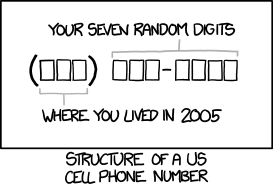Fair warning, this article contains opinions and editorial content. You’re welcome to continue reading or come back in a couple of days. Then I’ll return to the more traditional mix of geo-oddities and weird locations.
First, let me leave a note to myself in the Year 2050. Hopefully I’ll still be alive and writing 12MC, preferably both. Although writing from the grave might be interesting too. “Write about how there was once a time when people used geographically-based numerical strings to communicate over long distances.“
The North American Numbering Plan
I’ll focus on the North American Numbering Plan because I have a passing familiarity with it. Likewise, parallels could certainly be drawn to other numbering plans beyond the continent.
The first three digits are known as a “numbering plan area” or NPA. Most people know this as the “Area Code” so I’ll use that term throughout the remainder of this article. The next three digits are the NXX, or the exchange . NXX isn’t actually an acronym, it represents specific numerical characteristics.

Let’s use my beloved Commonwealth to consider the complexity that evolved over time. Virginia once had a single area code, 703. Population increases along with device accretion, particularly the rise of mobile devices, resulted in ever-increasing territorial divisions. It also necessitated bizarre “overlay” area codes. Those arose when it became too difficult to keep slicing the map into ever smaller chunks. People didn’t want to have to change numbers every few years.
It doesn’t matter. Soon enough it will be completely irrelevant.
The NXX portion of a telephone number, the exchange, still retains a geographic identity although it’s gone underground. It was once very visible. The Glenn Miller Orchestra popularized a composition by Jerry Gray in 1940 called PEnnsylvania 6-5000, as an example. It was the telephone number of the Hotel Pennsylvania in New York City. You’ll probably recognize the song even though it was released long before most of us were born. You can listen to it on YouTube if you like. The hotel continues to exist although the number converted to the much less memorable 736-5000 generations ago.
The Point
Where am I going with this? Right. Just like nobody really cares or considers that telephone exchanges are physical places — except perhaps from an historical or nostalgic perspective — the same will soon be true for area codes. I started noticing this probably about three to five years ago. It’s hard for me to pin down a date exactly because it’s been such a gradual movement.
Employers that wish to remain relevant recognize a need to refresh and replenish their workforce. Many of these are newly-graduating students from colleges and universities. My employer, and probably many of yours, recruits actively on university campuses. We gain a steady stream of entry-level professionals each summer who quickly blend into the group. They’re wonderful. They bring fresh perspectives and influence new approaches.
My organization has a critical mission that has to continue regardless of weather conditions or other external factors. So we’ve developed multiple ways to communicate, including sharing personal telephone numbers as a contingency. That’s where I first noticed the trend as it grew.
Newer employees, all living within the Washington, DC area, had “home” phone numbers with unusual area codes. When I’d ask, since I’m a curious sort because I’m a bit of a telecom geek, they’d invariably tie it back to a mobile phone number they’d retained since high school or college. For them the area code lost its territorial meaning a long time ago. It became a geographic signpost of a formative point in their life (much like a Social Security Number) rather than a reflection of a current place.
The Demise of the Home Phone
They don’t have home phones. The logic: Why would anyone want a device tied to a place instead of a person? That’s no grand revelation, either. Many of us have given up our home phones. The revelation may be that we’re getting closer to a tipping point. Enough people have relocated, taking their numbers with them, to begin disassociating area code from geography.
That’s not true just for mobile phones either. I don’t have a black plastic box with a handset and a keypad on my desk while I work. We all use Internet Protocol phones that replicate the functions of traditional telephones. Now the computer is the phone. I can work from an office, from home, from a hotel or wherever I choose. Nobody calling me can tell the difference. I plug a headset into a USB port on a device loaded with the necessary software and the network finds me. We even have remote workers who telework from their homes full-time in locations all around the country and they all have “Northern Virginia” area codes served by IP phones.
Telephones are going the way of the dinosaur anyway although that’s probably a conversation for a different day. Chat, video and collaboration tools are all eating into telephone usage. My work phone rings maybe once or twice a week now and I’m a bit annoyed when it happens: “why are they calling?”
Conclusions
So area codes are becoming irrelevant as geographic identifiers, and telephones are becoming irrelevant as a primary means of long-distance communication. I imagine a day in the not too distant future where each of us will have a cute unique identifier that bounces off some central registry somewhere.
It will allow people to communicate with us using whatever method seems most appropriate for that specific conversation (including something as quaint and antiquated as a voice call if that’s what they want). The integrated chat/phone/video function of GMail already operate similarly although I see something more global, less proprietary. It would work much like how domain name servers operate today where it’s easier to remember twelvemilecircle.com than a big string of seemingly random numbers.
Goodbye, area code. Your (user visible) days are numbered.


Leave a Reply